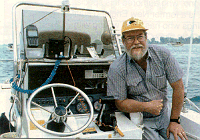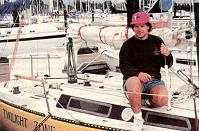Navigating cyberspace
By Bob Stepno
Boat out of water? Fish not biting? Running into a long stretch of bad weather? Too much time and money left after taking care of your boat?
Whatever your excuse, the world-wide Internet computer network has become a cruising ground for folks with nautical interests, and it holds both a wealth of information and a chance to connect with like-minded individuals from Sweden to Australia to the St. Clair Flats.
The St. Clair Flats are in Michigan, a difficult cruise from most coastal locations, but not even a day-sail away on the Internet -- in fact, they're a place you might stumble across accidentally.
The Flats are a pretty good example of the way one thing can lead to another on the Internet. First, you find a message on an Internet boating bulletin board mentioning that someone has been selling commemorative hats to participants in the electronic boating discussion. You ask who has the hats, and whether there are any left.

A day or two later, Peter Meek, the man with the hats, responds that he still has a few and points toward his World Wide Web home page, (http://www.msen.com/pwmeek), where you can see a picture of the colorful logo printed on them. The World Wide Web can show pictures, unlike plain electronic mail and discussion groups, but the Web requires special software and a better connection (see sidebar).
With the right electronic gear, however, you can check out hats, charts, drawings of race courses, boat designs, photographs of boats and photographs of approaching hurricanes, among other things. You can also run programs, including programs that search the network for information, programs that survey the opinions of people on the Net and programs that ask a database to find you all the 40-foot powerboats in Soundings' online database.
Arriving at a personal Web site like Peter Meek's, you can find more personal information -- in this case, not only about the hats that he sells (I wanted one; I had a pretty strong opinion about what it should be like; so, I ordered some up and offered the rest to the Internet community at cost, in the nonprofit spirit of the community.), but also a collection of his essays about his boat Honky Tonk, his life and the St. Clair Flats.
The Flats are a 70- to 100-square-mile area of freshwater delta and marsh, located about 30 miles northeast of Detroit. They fill the northeastern corner of Lake St. Clair ... My family has had a cottage in the Flats since the 20s, says Meek, who makes his home in Ypsilanti on the wrong side of the Detroit metro area from his boat. He spends three to four days a week boating during the summer, putting one or two hundred hours on the boat a year. He's retired. Computers and computer communication have been a hobbyby for him since 1978, starting with the BIX service, one of the first to provide Internet access to home computer users.
Meek's introduction to the Flats is a nice job -- not something pieced together by a visiting magazine writer or cruising guide publisher, but a dedicated boater's local knowledge about his favorite cruising grounds. As for the hats, Meek says he's shipped them out to Great Britain, Europe and Australia, with the honor system working pretty well for payments.
Elsewhere on the net, the America's Cup organization, boatbuilders, sailing organizations, magazines and equipment suppliers have all gotten into the sideline of publishing boating information on the Internet. (The America's Cup pages, drawing on the technological and marketing expertise of some of the Cup sponsors, have been nominated for site of the year honors.) Some of these online publishers think they'll make money someday. Others think it adds value to their current customer services, and some do it just for fun.
Like its spidery namesake, the Web is sometimes fragile and sometimes resilient. One of the first commercial Web sites offering a marine shopping mall online, CyberWharf, disappeared in May with an announcement about financial difficulties, then reappeared with its dozens of links intact, before vanishing again. (The company described its demise as a "cybersplat.")
The real magic of the World Wide Web is that any author's electronic pages of information can include links to other pages anywhere on the Web. You point a computer cursor at the words click here or My Home Page, and your World Wide Web browser software takes you from one page to another.
So not only does Peter Meek's home page lead you to his hat page, his boat page or his Flats page -- it connects to pages created by a sailor named Einar Brandt in Sweden, a Coast Guard officer in Seattle, a Merit 25 sailor in California whose signature says "Call me Fishmeal," and official or unofficial online newsletters for sailboat classes from Laser to Snipe to Soling.
Einar Brandt's pages include a crew-matching service for sailors looking for a ride, and a list of more than 100 boating resources on the Internet compiled by Stephen Jones, whose address is in the philosophy department at the University of Alberta. These lists of lists seem to go on forever, cross-referencing each other with no worry of copyright infringement. Quality varies, and surprises are many.
An Italian sailing site offers an English translation at the touch of a mouse-button. Another link goes to a page called Sailing in France, with an address on a computer in France, where you find another heading for Places to cruise by. The first, and only, entry in the database this spring was a description of one of the world's hotbeds of sailing ... Long Island Sound. It's a small world on the Web.
Elaine Chapin, a lifelong sailor, finished her doctorate this spring at the University of Illinois, where she created her own home page (http://www.cen.uiuc.edu/ec10576/) linked to the University of Illinois sailing club's page, which she says has helped the club attract new members. As graduation approached, she used the CalTech Sailing Club pages (http://www.cco.caltech.edu/ward/sailclub.html) to help find out about sailing opportunities near her post-graduate job as a scientist at a NASA/CalTech lab.
Fishmeal's pages -- dozens, if you printed them -- include parodies of America's Cup newsletters, a protest of the trademark claims of the America's Cup Organizing Committee and announcements for a zero-handed trans-Atlantic race.

Fishmeal is Paul Kamen, a naval architect, writer and a moderator of the sailing forum on the Well in San Francisco.Coast Guard Lt. Cmdr. Bill Edgar's page, which mentions that it is not an official Coast Guard publication, at least not yet, includes a link to an aid to navigating the Internet itself.
All of these pages link to dozens more locations on the Web, and you can island-hop from site to site for as long as you can stand to look at a computer monitor and hold a mouse in your hand. It's a browser's paradise. In fact, some sites seem to be just lists of links to other sites, with little content of their own. Internet fans have called skipping from link to link surfing the net (a phrase already trite from overuse), but more-nautical metaphors seem appropriate.
In that case, some of these sites are like desert islands covered with bottles full of messages and maps pointing toward other islands on the horizon. Sometimes you find interesting things, sometimes just more links.Searching for specific information is also possible, but equally adventurous. Edgar's page offers a search program, one of many available at Web sites that search indexes of key words collected from all over the network.
A quick search on the word boating found more than 800 hits, ranging from a copy of Two Years Before the Mast to announcements of regattas in California and a fishing contest in North Carolina, a history of piracy and sites showing weather satellite photos, selling boats, selling paintings of boats, selling software for boaters and selling a magazine about antique boat hardware.
The search on the word boating even found a collection of personal newspaper ads (at http://www.nando.net) from women, at least one of whom was looking for the right single sailor.